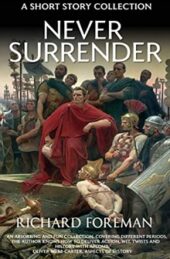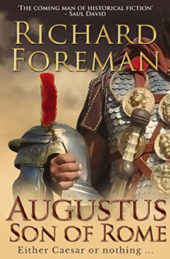Richard, firstly can you tell us a little about your latest book, Spies of Rome: Blood and Poison?
I wanted to write a short, entertaining novella which introduced readers to the character of Rufus Varro (his humour and the age he lives in). At the same time, Blood & Poison may be considered a bonus story, set just after the events in Spies of Rome: Blood & Honour, for fans of the series.
The origin of the project came through being asked to contribute a couple of short stories to the anthologies of Rubicon and Imperium. Extending those stories into a novella was an itch I had to scratch. There are worse itches to scratch, as a Roman soldier with the pox would confess.
Rufus Varro is not unlike the protagonists of more modern spy thrillers. He likes his drink and his women and is wonderfully flawed – in a way that makes him very relatable, despite the period he lived in. Was it always your intention when writing the Spies of Rome series to write him like this?
Yes, I was always mindful of making Varro a reluctant spy. He displays cowardice as much as courage, which of course makes him more human. By being such a social animal, in terms of his drinking and affairs, Varro is comfortable in dealing with different tiers of society, which helps him in relation to his investigations. It may be the case however that, by the close of the series, I made Varro too heroic and dutiful.
In a recent interview, you mentioned Rufus Varro was one of your favourite heroes, or anti-heroes. Why you hold him in such high regard?
Varro is witty and world-weary. What’s not to like? Varro is a natural satirist, who is not afraid to ridicule himself – as well as others. Ancient Rome is all the more colourful for seeing it through the poet-spy’s eyes. Varro is comfortable getting drunk with reprobates in the Subura, yet he is also a great conduit for meeting such figures as Ovid, Marcus Agrippa and Tiberius. He straddles Rome like a shorter, drunken Colossus.
Readers have been attracted to his melancholy streak too. Being too ironic, too much of the time, can be a double-edged sword. There is something tragic in seeing the comedy in everything. Varro may be a womaniser, but he is still in love with the woman he divorced. Although a reluctant spy, he is also an effective one – a victim of his own success.
A sense of courage ultimately triumphs over a sense of cowardice too. Tragic heroes can still be heroes, as can anti-heroes.
You previously said that Blood and Poison will probably be the last time you write about Rufus Varro – which to your many fans of the Spies of Rome series may come as a disappointment. Is there any chance that we may see the adventures of Varro back on our bookshelves in the future?
The answer is a only definitely maybe, at best. I’ve scratched the itch, and may be done writing full-length books about him. The ending to Spies of Rome: Blood & Secrets is satisfying and definitive too. I will always return to stories set in Rome, however. Perhaps Varro will appear as a cameo in another series.
The period in which Blood and Poison is set was obviously a very turbulent time within the Empire. The Civil War has come to an end and Augustus is the brand-new Emperor as Rome moves away from being a Republic. Is there another turbulent time in Rome’s history that you would love to write about – something like the Punic Wars come to mind?
Rome is endlessly fascinating, both in terms of events and personalities. I have written about Julius Caesar and Marcus Aurelius, as well as Augustus. I have flirted with the idea of writing about Constantine, but kicked that project into the long grass. I’m not sure I’d want to write about the Punic Wars, but never say never. Due to the new Gladiator film coming out I may return to the characters from Sword of Empire, but I’ve got one or two other books I need to finish beforehand.
Our readers are always on the look out for new writers and books to try out. Can you recommend any authors, both fiction and non-fiction, who write about Ancient Rome?
One of the history books of the year is Pax, by Tom Holland. As you can hear on the Aspects of History Summer Reading Podcast, we were all in agreement about how talented Holland is. And it’s rare for that many authors to agree on anything.
I do not believe I would have written the Spies of Rome series if I had not been such a fan of Steven Saylor and his books. I can highly recommend his Gordianus the Finder novels.
In terms of military/adventure fiction, readers will do well to check out Simon Scarrow. Elodie Harper’s books have been rightly praised.
Wearing my hat as a publisher, I have had the pleasure and privilege of commissioning a number of authors, both new and established, to write Roman fiction. Readers of the Spies of Rome series will doubtless be interested in the Caesar’s Spies books, by Peter Tonkin. Fellow Aspects of History authors, Alistair Tosh and Fiona Forsyth, have also broken through in the past year.
I also spoke to Daisy Dunn recently – and she is due to bring out a blockbuster book about the Ancient World, so readers should keep their eye out for that.
Richard Foreman is a bestselling writer and the author of Blood & Poison.







